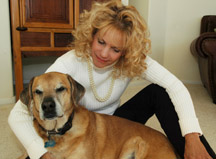Over the last fifty years the evidence supporting the claims of mindbody researchers has been steadily growing. Stress apparently makes us more than just tired. It inhibits the immune system, increases the production of epinephrine, norepinephrine and cortisol. It is linked with heart disease and other chronic diseases, as well as infertility.Â
Not too long ago, one study found that the stress levels of a woman struggling with infertility are similar to those of someone who's just been told they have HIV. In another study, Alice Domar, Ph.D.,H (HarvardMedicalSchool) showed the positive effects of stress-reduction on women who were trying to get pregnant.
By changing the negative thoughts ("I'll never have a baby") to positive thoughts ("I'm doing everything I can to get pregnant")-just words repeated internally-they were able to change the body's response. The data spoke for themselves: Fifty-five percent of the women in the experimental group (those who used relaxation, yoga, imagery, and cognitive restructuring) got pregnant, in contrast with only twenty percent of the women in the control group.
This is especially noticeable with people who suffer from chronic pain. One occupational therapist in private practice in a NY suburb commented, "People in pain get into a 'set' and they don't hear what they need to or open up to healing well. Half of my work with them is changing their thinking and helping them to relax and detach from their disease."
Stress is a short-term and long-term killer. It has also been shown to affect the aging process and our susceptibility to disease in general. The average life expectancy of a man living in the United States is 73. The average life expectancy of a male police officer is 59.Â
While adrenaline helps us to prepare for emergency action, the chemical cascade it initiates inhibits our ability to repair ourselves, to digest food properly, or even to reproduce. Epinephrine (a secretion of the adrenal glands) has been shown to constrict blood vessels. When this occurs in the uterus, it interferes with conception. Epinephrine also increases heart rate. A normal heart rate is 80 beats per minute (bpm), a dangerous stress level is 180 bpm, and police officers have been found with 300 bpm after a shooting. One study showed that traumatic stress can affect a person's neuroendocrine and immune systems for twenty years.
Short and Long-term Consequences of The Chemistry of Thoughts
Clearly, what we do with stress not only has immediate consequences, but long-term and sometimes invisible implications. Experts have agreed that how we "hold" stress, the language we use to one another as well as to ourselves in our private thoughts, and our attitudes have a great deal to do with the impact stress has on our bodies. Dr. Hans Selye, the father of modern Stress Medicine, even broke stress into two separate entities: Simple Stress, or the stress which depletes us and Eustress, or stress we experience as challenging and exciting, which enhances our immunity.
The question then becomes: How do we use this in the field? How can we utilize these ideas to get ourselves out of a bad situation alive?
Â
What Can We Do, What Can We Say: Verbal First Aid in Real Life
Deepak Chopra begins to answer that last question when he uses the metaphor of two people in a roller coaster. The following example is an adaptation and elaboration of his story:
Two people are getting into a roller coaster. One is a young cowboy-hardly moving off the platform yet, but his arms are already in the air and he's hootin' and hollerin' with anticipation. His heart is pounding. But he's smiling. The woman next to him has her hands clamped down onto the metal rod in front of her, her heart pounding. She is not smiling. Both are in the same seat, on the same ride, but they are clearly not experiencing the same thing. The difference? Their thoughts.
The young cowboy in the roller coaster sees that the woman next to him is nervous. He turns to her. She looks to him, her eyes wide. She says, "How can you be so relaxed?" He smiles, points to his hat, "It's my magic hat." He takes it off his head and hands it to her. "You hold on to it while we ride, okay? It's easier to enjoy the ride when you know you've got magic with you." Her hands loosen their grip. She takes the hat. Tentatively, she smiles.
According to medical experts, anxiety (or fear) and pain are inextricably woven together for the vast majority of people. A great deal of human discomfort comes from our anticipation of it and our perception of it. Unfortunately, there is nothing marketed as vigorously in this country as is fear. If we're not scared to death by a headline, it's a radio report, a movie, a video game, or a television show. We're literally bombarded by images and ideas that promote fear. We are propelled by it and sold by it.




